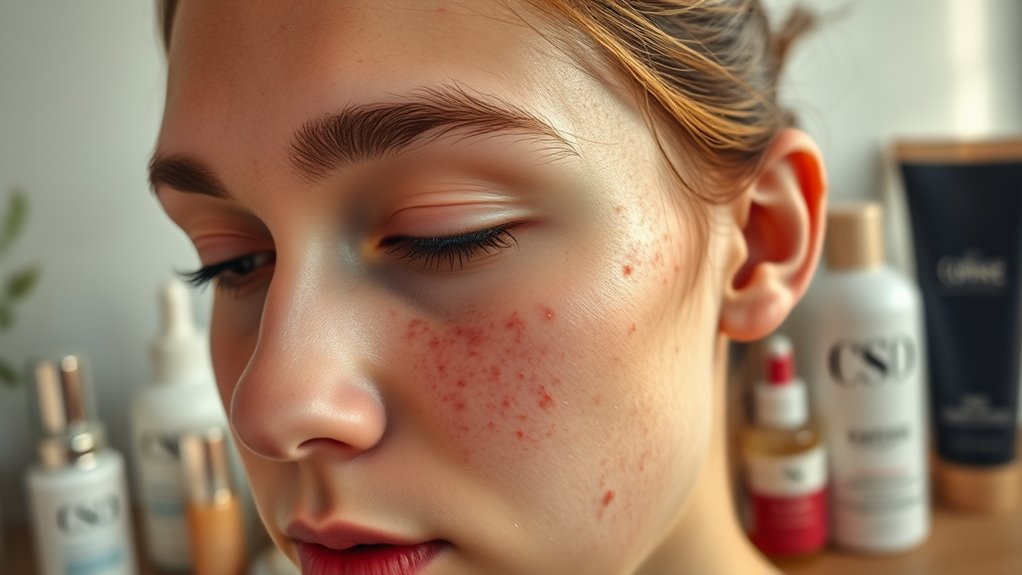The Surprising Reason You Still Have Acne-Even After Using Top Products
You’ve tried every top acne product, yet you’re still breaking out, much like Sarah who cut dairy and saw results. It’s often internal triggers like diet and stress disrupting your skin’s balance. Stick around to uncover simple fixes that could transform your routine.
Key Takeaways
- High-glycemic foods and dairy trigger hormonal changes that increase oil production, worsening acne despite effective products.
- Chronic stress elevates cortisol levels, boosting inflammation and breakouts even with top skincare routines.
- Hormonal imbalances, like excess androgens, overstimulate sebum production, causing persistent acne beyond topical treatments.
- Incorrect application of products, such as skipping cleansing or wrong order, traps dirt and reduces their effectiveness.
- Environmental factors like pollution and UV rays inflame skin and clog pores, counteracting even the best acne products.
Hidden Dietary Factors Contributing to Acne
Have you ever wondered why acne persists even after trying the best products?
While your acne skincare routine targets surface issues, hidden dietary factors often undermine your efforts.
Research shows that high-glycemic foods like sugary snacks spike insulin, boosting oil production and inflammation, fueling breakouts.
Dairy and processed items may trigger hormonal changes, worsening acne despite diligent cleansing.
You can enhance your acne skincare routine by cutting these triggers—studies confirm that a low-glycemic diet reduces lesions by up to 50%.
Take control; pair topical care with smarter eating for clearer skin.
Furthermore, incorporating more low-glycemic foods into your meals can help stabilize blood sugar and reduce acne flare-ups.
The Effects of Stress on Skin Health
You know stress doesn’t just weigh on your mind—it directly triggers breakouts by ramping up oil production and inflammation in your skin.
When you’re under pressure, these stress-induced reactions make it harder to manage acne despite your best products.
Plus, stress disrupts your hormonal balance, worsening skin issues like uneven texture and persistent pimples.
Moreover, chronic stress can accelerate premature aging by increasing oxidative damage and collagen breakdown.
Stress-Induced Breakouts
Stress profoundly affects skin health, triggering breakouts through mechanisms like elevated cortisol levels, which boost oil production and inflame pores. You might notice your skin reacting to daily pressures, as stress ramps up inflammation and clogs pores, making acne persist despite top products. This evidence-based link shows how unmanaged stress worsens breakouts.
| Stress Factor | Skin Impact | Quick Tip |
|---|---|---|
| Work deadlines | Increased oil production | Practice deep breathing |
| Lack of sleep | Pore inflammation | Use meditation apps |
| Emotional upset | Heightened bacterial growth | Start an exercise routine |
| Daily pressures | Persistent breakouts | Try journaling daily |
Hormonal Skin Effects
Hormones profoundly shape skin health, particularly when stress triggers cortisol spikes that amplify oil production and inflammation.
You might notice breakouts persisting despite your best efforts, as stress disrupts your skin’s balance.
Here’s how it unfolds:
- Cortisol surges: Stress elevates cortisol, overstimulating oil glands and clogging pores.
- Inflammation boost: It intensifies immune responses, worsening acne lesions.
- Barrier damage: Hormonal shifts weaken your skin’s protective layer, inviting irritants.
- Healing delays: Elevated hormones slow recovery, prolonging blemishes.
Addressing stress through lifestyle changes can restore harmony and clear your skin.
Hormonal Influences You May Be Overlooking
Ever wondered how subtle hormonal fluctuations might be sabotaging your acne battle? You could be ignoring key players like androgens, which spike oil production, or estrogen dips that disrupt balance. Studies show these hormones directly influence breakouts, even with top products. Here’s a quick overview:
| Hormone | Key Influence |
|---|---|
| Androgens | Boost sebum, clogging pores |
| Estrogen | Regulates oil, reducing spots |
| Cortisol | Increases inflammation, worsening acne |
Addressing imbalances through lifestyle tweaks helps you win the fight. Implementing evidence-based solutions from comprehensive guides can further enhance your skin’s clarity. (112 words)
Common Skincare Application Mistakes
While hormones can disrupt your skin’s balance, improper application of skincare products often exacerbates acne issues you didn’t anticipate.
Research from dermatologists highlights how these errors trap oil and bacteria, hindering product performance.
To optimize your routine, avoid these common mistakes:
- Skipping thorough cleansing: You’ll leave residue that clogs pores and fosters breakouts.
- Over-applying products: This creates a barrier, trapping dirt and causing irritation.
- Ignoring application order: Applying heavier creams before lighter serums dilutes their effects.
- Rubbing instead of patting: It damages your skin barrier, inflaming acne-prone areas.
To maximize absorption and effectiveness, always apply your products in the thinnest to thickest order.
Environmental Elements Worsening Breakouts
Environmental factors, such as pollution and UV rays, actively sabotage your skin’s defenses, triggering breakouts that undermine even the best routines.
Airborne pollutants penetrate your skin, causing inflammation and blocking pores, as studies link high pollution levels to increased acne severity.
UV rays accelerate oxidative damage, boosting sebum production and disrupting your skin’s barrier, which fosters bacterial growth and persistent pimples.
Seasonal allergens and humidity fluctuations further irritate your complexion, amplifying sensitivity and breakouts.
Research confirms these elements overwhelm your skin’s natural protections, explaining ongoing acne despite top products.
To counteract pollution’s damage on skin cells, incorporating skincare routines with antioxidants can provide essential protection.
Actionable Steps for Lasting Skin Improvement
To combat persistent acne and build resilient skin, start by adopting targeted habits that address root causes.
You’ll transform your routine with evidence-based strategies that tackle inflammation and environmental triggers.
- Revise your diet: Eliminate high-glycemic foods and dairy, as research shows they spike insulin and promote breakouts.
- Refine skincare practices: Apply gentle, non-comedogenic cleansers twice daily and use antioxidants to neutralize free radicals, per dermatological studies.
- Reduce stress levels: Incorporate yoga or meditation, since elevated cortisol directly worsens acne, according to clinical trials.
- Seek expert guidance: Consult a board-certified dermatologist for tailored treatments, ensuring long-term efficacy based on your unique skin profile.
Additionally, explore dietary triggers like processed sugars and refined carbs, as they can exacerbate acne by increasing inflammation and oil production, based on comprehensive studies.

